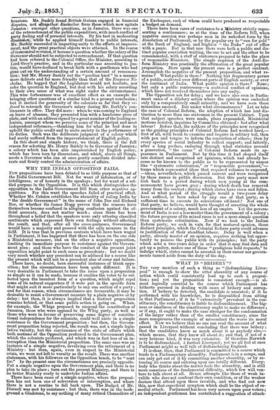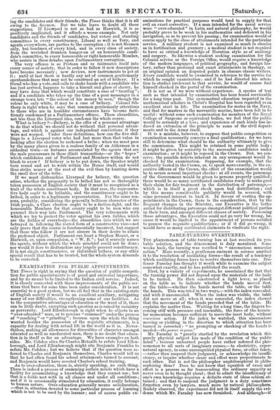WHAT IS "BRIBERY " ?
THE very mention of such a thing as " disfranchising Liver- pool" is enough to show the utter absurdity of any course of action which could consistently lead up to such a proposi-
tion; and yet the pioposition is consistent enough—is al- most logically essential to the course which Parliament has hitherto pursued in dealing with cases of bribery and corrup- tion. If bribery be detected, the candidate is unseated; if it be performed with his knowledge, he is disqualified from sitting in that Parliament ; if it be " extensively " prevalent in the con- stituency, the constituency is liable to disfranchisement. The big- ness or smallness of the constituency ought to make no difference ; or if any, it ought to make the case stronger for the condemnation of the larger rather than of the smaller constituency, since the more conspicuous the example of misconduct the worse its moral effect. Now we believe that no one can read the account of what
passed in Liverpool without concluding that there was bribery ; that the candidates knew as much about it as anybody else,—
which means, that they knew all about it; and that, if not of a very heinous kind, it was very extensive. If therefore Harwich is to be disfranchised, a fortiori Liverpool; yet we all feel at once Parliament might as well talk of disfranchisino. England.
It is clear, then, that Parliament is committed to a course which tends to a Parliamentary absurdity. Parliament is in a scrape, and can only get out of it by committing another absurdity, or by re- tracing its course and entering upon one totally different. Every- body who thinks about the matter feels the absurdity, and is still more conscious of the fundamental difficulty, which few will ven- ture to talk about at all. Hence attempts like those of weak in- valids who dare not confront their own condition, or of the weaker doctors that attend upon those invalids, and who find out now this, now that superficial symptom which shall be the object of re- medial attack. Parliament has been very severe upon poor voters; an independent gentleman has contributed a suggestion of attack- ing the candidates and their friends; the Times thinks that it is all owing to the freemen. But we take leave to doubt all these suggestions. If Liverpool is not as bad as Harwich, it is as positively implicated, and it affords a worse example. Not only candidates and the friends of candidates, but voters and standing committees in every constituency, Liberal as well as Tory, and agents everywhere, are parties to the corruption ; it is not freemen only, but bondmen of every kind, and in every class of society, from the wretched drunken hanger-on of an honourable candi- date's committee, to every honourable or right honourable Member, who assists in these debates upon Parliamentary corruption.
The very offence is so Protean and so insinuates itself into every corner of society, that in order to follow it new descriptions have become necessary ; new devices, new instruments to get at it ; until at last there is hardly any act of common gentlemanly openhandedness that may not be construed an act of bribery. If a friend who has a vote, and calls to shake hands with a candidate who has just arrived, happens to take a biscuit and glass of sherry, he may have done that which would constitute a case of " treating"; and if a candidate who takes up the time of a poor messenger in a strange town lets " the colour of his money be seen," though the colour be only white, it may be a case of bribery. Colonel Sib- thorp is right when he says that common gentlemanly attentions to those who are in humbler circumstances have become facti- tiously condemned as a Parliamentary offence. These absurdities, not less than the Liverpool idea condemn the whole course.
What is bribery P—Bribery, is the offer of a personal advantage to do that which we should not do without that personal advan- tage, and which is against our independent convictions if they were not warped. Under these definitions, how can the five shil- lings to a Liverpool voter who had lost more than that value in looking after the election be reckoned a bribe ; when we must pass by the many places given to a zealous family of an Alderman in a cathedral town—or fortunes accumulated by the agents that are the male procuresses in these illicit transactions—or the " hopes " which candidates out of Parliament and Members within do not blush to avow ? If bribery is to be put down, the Speaker might turn round and set to work within the House itself, and would thus strike nearer at the root of the evil than by hunting down the small deer of the tribe.
If we must disfranchise Liverpool for bribery, the question arises, whether the propensity to be bribed has not so thoroughly taken possession of English society that it must be recoghized as a trait of the whole constituent body. In that case, the representa- tive body ought to be bribable, and the constituency ought to be bribed, in order to a legitimate representation. For the same rea- sons, probably, considering the generally bellicose character of the Irish people, a Clare election ought to be a faction-fight, and the honourable Members for that county ought to be men who can pummel their way into Parliament. The very refinements with which we try to protect the voter against his own foibles, which are the foibles of everybody—the absurdities into which we are betrayed in following the varied form of a constructive vice—not only prove that the course is fundamentally incorrect, but suggest that those who follow it are not sincere in their desire to attain the professed object. Parliament can hunt a Stephen Mount, or a Harwich, or, upon compulsion, a " W. B."; but it scarcely names the agents, without which the whole mischief could not be done ; nor would it dare to disfranchise any largely peccant constituency. It is not single constituencies, or individual bribees, or any other special result that has to be treated, but the whole system demands to be corrected.



























 Previous page
Previous page